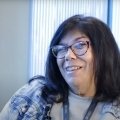Black History Month Visibility Campaign: Novlette Paige, BSN-R

Throughout Black History Month, we are spotlighting our Black staff through our Visibility Campaign series, as well as staff who have a passion for support and advocacy. Today's spotlight goes to Novlette Paige, BSN-R.
Novlette began her career at Wheeler in 2013 as a senior counselor with Community Support for Families. During her time as senior counselor, she went to school and received her Associate of Science Degree in Nursing in 2015. In 2019, Novlette returned to Wheeler as a registered nurse at the organization’s the organization's Family Health & Wellness Center in New Britain.
 How do you support your health and wellness? I hike! Since August 2021, I have completed 46 mountain hikes, which include Mount Greylock and Mount Monadnock in below- freezing temperatures. Hiking saved my life. Having suffered personal loss due to COVID-19 and since becoming an empty nester, I needed a sense of purpose. While hiking, I feel completely at peace; no worries, no fears, just me and the crunch of the leaves and/or snow beneath my feet. It literally calms my spirit and renews my soul. Just me and figuring out how I’m going to navigate climbing a mountain and the feeling of achievement when I’m on top, and of course, the high of danger! Hiking is the thrill I never knew I needed. My 2022 goal is to complete the #52 Hike Challenge and hike the 4000-footer mountains in Vermont, as well as return to my home country of Jamaica to hike Blue Mountain Peak with an elevation of 7,402 feet, and approx. 34 miles, round-trip.
How do you support your health and wellness? I hike! Since August 2021, I have completed 46 mountain hikes, which include Mount Greylock and Mount Monadnock in below- freezing temperatures. Hiking saved my life. Having suffered personal loss due to COVID-19 and since becoming an empty nester, I needed a sense of purpose. While hiking, I feel completely at peace; no worries, no fears, just me and the crunch of the leaves and/or snow beneath my feet. It literally calms my spirit and renews my soul. Just me and figuring out how I’m going to navigate climbing a mountain and the feeling of achievement when I’m on top, and of course, the high of danger! Hiking is the thrill I never knew I needed. My 2022 goal is to complete the #52 Hike Challenge and hike the 4000-footer mountains in Vermont, as well as return to my home country of Jamaica to hike Blue Mountain Peak with an elevation of 7,402 feet, and approx. 34 miles, round-trip.
How can employers support the health and wellness of their staff; specifically, their Black staff? Employers should coordinate fun, educational, culturally sensitive events that can provide opportunities for physical activity. Also, they should create an employee reward program to include spa treatments, gym memberships, exercise equipment, and possibly a gym in the workplace.
Why is it important to address racism as a public health issue? Racism is mentally draining! The Black community suffers silently from post-traumatic stress disorder, PTSD, having inherited the trauma of slavery and segregation. Self-actualization is a basic need, and when you are limited to optimize your capabilities, this potentially can perpetuate low self-esteem, which is often subconsciously transmitted through generations, creating a generational curse. In the long run, this unattended psychological trauma manifests itself in widespread mental health issues and crime.
How can health care organizations and providers address the racial inequities in healthcare?
- Give quality health care to everyone, regardless of their differences.
- Health care organizations can offer more opportunities, including scholarships to people of color to encourage them to enter the medical and health administrative professions.
- More funding for scientific research in the Black community and utilizing Black professionals.
What are the most significant challenges that Black communities face today in achieving health equity?
- Education. Informing Black patients of how a disease can progress, affect their body long-term, and what steps should be taken.
- Benefits of preventative care, such as colonoscopy, seeing their primary doctor regularly, routine OB/GYN appointments, and prostate cancer preventative screenings.
- Lack of knowledge. Not knowing what resources are available to them.
- Financial decisions. Hourly paid workers must decide between maintaining health or covering daily living costs. If they do not have debilitating symptoms, then they neglect health for immediate monetary needs. They do not think they can afford health care, so they don’t bother seeing treatment.
- Physical fitness. Black people are not participating in outdoor activities such as hiking in comparison to Caucasians. For example, I go hiking at least three times per week, and 95 percent of participants are Caucasians. More often I am the only Black person on the trails. There is a fear, and even I had to conquer this fear, that it was ok to be alone with white people in the woods. This is a real fear! Stepping out of comfort zones to try new things, such as hiking in extreme weather, for example, during snow, freezing temperatures.
- Pressures of work. Working in labor- intensive positions drains their energy from participating in physical fitness after work. For example, we see more people of color being employed in positions such as housekeeping, nursing, cooks, environmental services (people who clean the floor and take out the garbage) and I’m sure this is true for people in similar socioeconomic groups.
Thank you, Novlette, for sharing your story!





